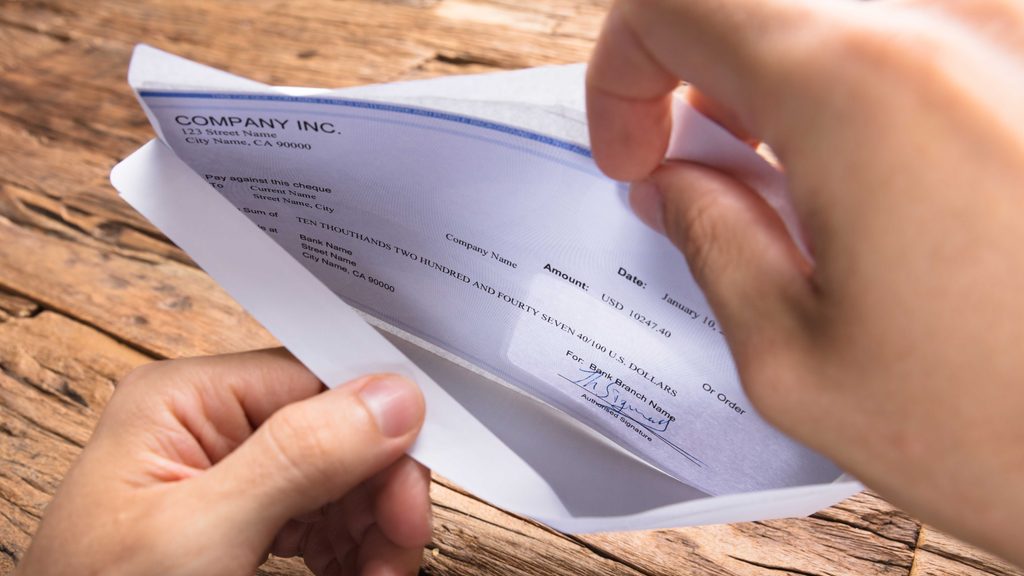How Long Does It Take For a Check to Clear?
Updated: Apr. 01, 2022

How long does it take for a check to clear? Use these guidelines to see when your funds might be available in your account.
Wondering how long does it take for a check to clear? While it would be great if there was one answer to that question, unfortunately, it depends on many factors, including everything from the bank that issued the check to how you deposit it to the age of your account.
Here are some guidelines to help you understand when the funds from the next check you receive might clear.
General rules
When it comes to how long does it take for a check to clear and how quickly a bank must make funds available for certain deposits in your bank account, there are some laws that govern certain scenarios.
For example, checks from the federal, state, or local government must be available for withdrawal on the business day following the business day the person deposited the check. Additionally, the first $200 of a check from the federal government must also be available on the business day the person deposited a check.
Bank policies
The next factor to consider in how long does it take for a check to clear is the bank itself. “Financial institutions always have a policy on deposits, and that includes the typical time it takes for check deposits,” Jacob Dayan, CEO and co-founder of Community Tax and Finance Pal explains. “The reason why is that they need to ensure that the funds are available in the payer’s account first.”
It’s a good idea to pay attention when opening a new account to understand the bank’s funds availability policy. Additionally, many banks make their policies available online.
Chase, for example, says in their online Deposit Agreement, “Generally, for checking and savings accounts, you may withdraw funds the next business day after the business day you deposit them.” They also note, however, that they can refuse a deposit at any time.
“As a general rule, your bank or credit union will probably make a portion of the funds (usually $100 to $300) available to you immediately upon deposit with the balance available the next business day,” Jack Vonder Heide, president of Technology Briefing Center, a firm that advises banks and credit unions on issues relating to technology including check processing, advised.
Methods of deposit
How you deposit your check, including mobile deposit or in person, could also have an effect on when you have access to funds. “In my experience, the quickest way is to deposit the check in person early in the day,” Vonder Heide says, noting that some ATM deposits are not posted until after the bank’s cutoff time, while mobile check deposits can be subject to limits, such as allowing only a certain amount deposited within a specific period of time.
Why a bank might hold funds
A bank might hold checks for a variety of reasons. This includes if there are insufficient funds in the payer’s account balance or if it’s a new account with little history, according to Dayan.
“If the check is large (usually over $5,000) or if you have a history of being overdrawn, the bank or credit union will probably delay funds availability for up to a week,” Vonder Heide adds. An international check can also delay the release of funds, he said.
But how long can a bank hold a check by law? It varies based on many factors, including the issuer of the check and the type of check.
Also, consider if a bank reconciles debits or credits first in the morning, as reconciling debits before adding in funds from checks (or other credits) could cause an overdraft if not enough funds are available.
The quickest ways to clear a check
While the amount of time can vary for how long it takes a check to clear for the account holder, there are a few options that can help speed the process.
By law, funds from a check deposited at the same institution from which it originated at a branch within the same state must be available the following business day. The same applies to cashiers checks and certified checks.
Chase Bank says, for example, when you deposit checks drawn from another Chase account, funds deposited with a teller will be available on the same day and similar ATM deposits may also be available the same day.
To speed things up, Ken Tumin of DepositAccounts.com recommends that when selecting a bank, “review the hold policies of your banks to find the one with the least hold times,” he says.
Tumin also explains that banks will sometimes clear checks faster when you have a consistent history with the payer, and he also suggests avoiding depositing into accounts that are less than 30 days old, which can cause delays.
You can also opt to skip the classic paper check, and if you don’t want to pay with cash or credit, instead use a person-to-person payment app like Zelle, which may be faster, instead, Vonder Heide suggests. Be aware of the times you should never pay with cash.
Another option, notes R.J. Weiss, a certified financial planner and founder of the personal finance site The Ways to Wealth, is the banking app Chime, which allows users to get a paycheck up to two days earlier. “In comparison, many traditional banks take 48 hours to recognize the deposit. This can help out those living paycheck to paycheck, as they’re the consumers often hit with banks fees,” he says, though he cautions to be sure that you understand any fees associated with these types of accounts.
How long does it take for a check to clear? While there are many factors, there are some surefire ways to get that money in your pocket sooner. Did any part of this article sound confusing? These are the financial planning terms everyone should know.